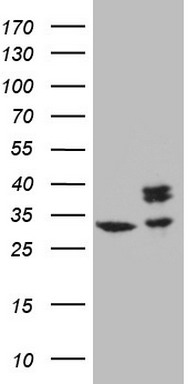SDHB Mouse Monoclonal Antibody [Clone ID: OTI3F5]
CAT#: CF808102
Carrier-free (BSA/glycerol-free) SDHB mouse monoclonal antibody, clone OTI3F5 (formerly 3F5)
Formulation: Standard
Frequently bought together (2)
Other products for "SDHB"
Specifications
| Product Data | |
| Clone Name | OTI3F5 |
| Applications | IHC, WB |
| Recommended Dilution | WB 1:2000, IHC 1:150 |
| Reactivities | Human, Mouse, Rat |
| Host | Mouse |
| Isotype | IgG1 |
| Clonality | Monoclonal |
| Immunogen | Full length human recombinant protein of human SDHB(NP_002991) produced in E.coli. |
| Formulation | Lyophilized powder (original buffer 1X PBS, pH 7.3, 8% trehalose) |
| Reconstitution Method | For reconstitution, we recommend adding 100uL distilled water to a final antibody concentration of about 1 mg/mL. To use this carrier-free antibody for conjugation experiment, we strongly recommend performing another round of desalting process. (OriGene recommends Zeba Spin Desalting Columns, 7KMWCO from Thermo Scientific) |
| Purification | Purified from mouse ascites fluids or tissue culture supernatant by affinity chromatography (protein A/G) |
| Conjugation | Unconjugated |
| Storage | Store at -20°C as received. |
| Stability | Stable for 12 months from date of receipt. |
| Predicted Protein Size | 28.8 kDa |
| Gene Name | succinate dehydrogenase complex iron sulfur subunit B |
| Database Link | |
| Background | Complex II of the respiratory chain, which is specifically involved in the oxidation of succinate, carries electrons from FADH to CoQ. The complex is composed of four nuclear-encoded subunits and is localized in the mitochondrial inner membrane. The iron-sulfur subunit is highly conserved and contains three cysteine-rich clusters which may comprise the iron-sulfur centers of the enzyme. Sporadic and familial mutations in this gene result in paragangliomas and pheochromocytoma, and support a link between mitochondrial dysfunction and tumorigenesis. [provided by RefSeq, Jul 2008] |
| Synonyms | CWS2; IP; MC2DN4; PGL4; SDH; SDH1; SDH2; SDHIP |
| Reference Data | |
| Protein Families | Druggable Genome |
| Protein Pathways | Alzheimer's disease, Citrate cycle (TCA cycle), Huntington's disease, Metabolic pathways, Oxidative phosphorylation, Parkinson's disease |
Documents
| Product Manuals |
| FAQs |
| SDS |
Resources
| Antibody Resources |
{0} Product Review(s)
0 Product Review(s)
Submit review
Be the first one to submit a review
Product Citations
*Delivery time may vary from web posted schedule. Occasional delays may occur due to unforeseen
complexities in the preparation of your product. International customers may expect an additional 1-2 weeks
in shipping.






























































































































































































































































 Germany
Germany
 Japan
Japan
 United Kingdom
United Kingdom
 China
China










